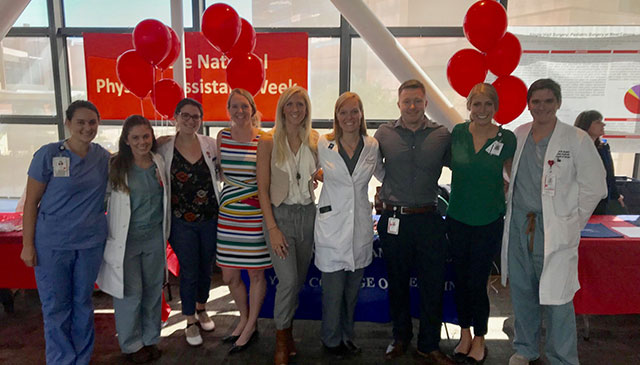
Every year from October 6 to 12, the American Academy of Physician Assistants (PAs) honors the 50-plus-year history of the PA profession, and the immeasurable contributions to health care made by PAs during that time, with a week-long celebration – National PA Week.
Texas Children’s will again be celebrating amazing PAs across the system with events and festivities throughout the week. These include:
Tuesday, October 8
- Taco Tuesday at each of our three Texas Children’s Hospital campuses
Wednesday, October 9
- West Campus main lobby: Poster display, games, crafts, and a chance to meet and thank PAs
- Texas Medical Center campus, Pavilion for Women 4th-floor conference rooms: “Get It Poppin’” Snack Break
Thursday, October 10
- Texas Medical Center campus, Auxiliary Bridge: Poster displays, games, crafts and photos
Friday, October 11
- The Woodlands main lobby: Poster displays, games, crafts, and a chance to meet and thank PAs
Helping lead the way in health care
Over the past half century, health care delivery has changed dramatically, with emphasis no longer solely placed on the expertise of a doctor, but rather on a team of caregivers. And because of the rising demand for health care, combined with the ongoing shortage of physicians in the United States, advanced practice providers (APPs) – PAs and nurse practitioners – have become major, even indispensable, players on that team.
APPs work in most areas of medicine, from primary care, to the emergency room, to surgical subspecialties. While they do not replace a physician, they work collaboratively on the care team and perform many of the duties a doctor might, including performing minor procedures, providing routine diagnoses, delivering health care education, assisting in the operating room and writing prescriptions.
“Because of the high demand for health care, it is widely accepted that much of that work couldn’t be accomplished without the partnership of PAs and nurse practitioners,” said Veronica Victorian, assistant director of Quality and Safety. “The collaborative relationship with the physician, and the increased opportunities and diverse responsibilities, also often mean a more autonomous role for PAs, in both the clinic and surgical settings.”
It’s then perhaps unsurprising that there has been a proliferation of APPs across the Texas Children’s system over the past few years.
“When I arrived at Texas Children’s in 2011, we had fewer than five PAs,” said Ryan Krasnosky, director of APPs at Texas Children’s. “The Department of Surgery alone now has more than 130 PAs.”
In fact, surgical PAs currently outnumber surgeons at Texas Children’s, an intentional part of the department’s strategy for growth. The Department of Surgery, moreover, is an excellent example of how PAs have added immense value that has led to improved patient access and the development of several key initiatives.
“There is no way that the Department Surgery can hire enough surgeons to keep up with the clinical demand of our rapidly growing city,” said Texas Children’s Surgeon-in-Chief Dr. Larry Hollier. “No one comes close to our surgical volume – 40,000 surgeries a year across every possible subspecialty. We rely on our PA partners to provide access at all of our locations throughout Greater Houston, so that patients and their families can be seen wherever and whenever they need help.”
PAs, along with nurse practitioners, have also proven to be key administrative leaders for the Department of Surgery, driving several critical initiatives around safety and quality, and have also been at the forefront of efforts to expand access to care in Houston, in Texas and across the southeastern United States.
“Saturday clinics, remote appointments via telemedicine and after-hours clinics have all largely been accomplished thanks to APPs, and we feel like we’re only scratching the surface,” said Kris Marsack, director of Surgical APPs.
Training the next generation of leaders
As the PA profession has evolved, so has the way Texas Children’s trains providers. One example is the Surgery Physician Assistant Fellowship, which was created in 2013 and was the first of its kind in the country.
You can watch this video to learn more about the fellowship.
“Pediatric surgery is not covered in most PA schools,” said Hollier. “We thought it would be a wonderful opportunity to take PA graduates and expose them to the broad diversity of pediatric surgery that exists here.”
During the intensive one-year program, fellows are fully immersed in the culture at Texas Children’s as they rotate through each surgical subspecialty service, including:
- Congential heart
- General pediatrics
- Hand/microsurgery
- Neuro
- Ophthalmology
- Orthopedic
- Oto
- Plastic/reconstructive
- Surgical ICU
- Surgical hospitalist
- Trauma
- Urology
The program also includes dedicated research time and suture, cadaver, and simulation labs. Training is provided in clinics, on the surgical floors and in the operating room, and involve pre-, intra- and post-operative care. Fellows can also participate in and help lead several community service initiatives, including the Family Fun Runs at Texas Children’s Hospital campuses in The Woodlands and Katy, the annual APP backpack drive.
Since its inception, the fellowship has grown to include eight providers, and is a valuable pipeline for talent and a unique training opportunity for providers who want to join the Department of Surgery team at Texas Children’s.
“We aim to retain every fellow and we are thrilled to see the number of applicants rise each year,” said Jackie Broda, PA-C and clinical lead of PA Fellowships.
Learn more about the Surgery Physician Assistant Fellowship.

